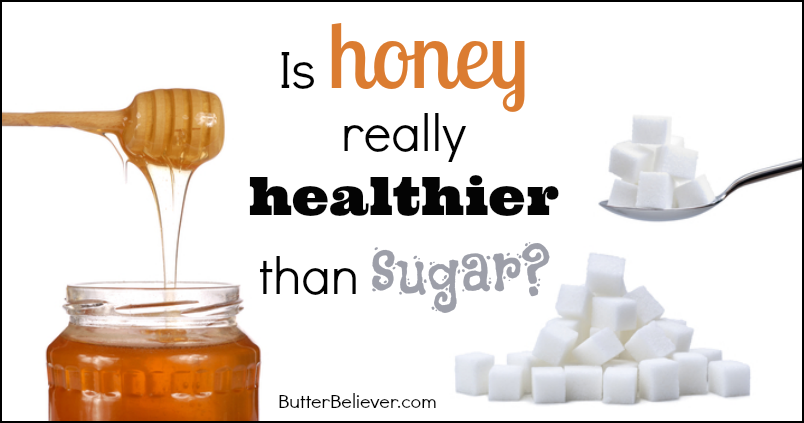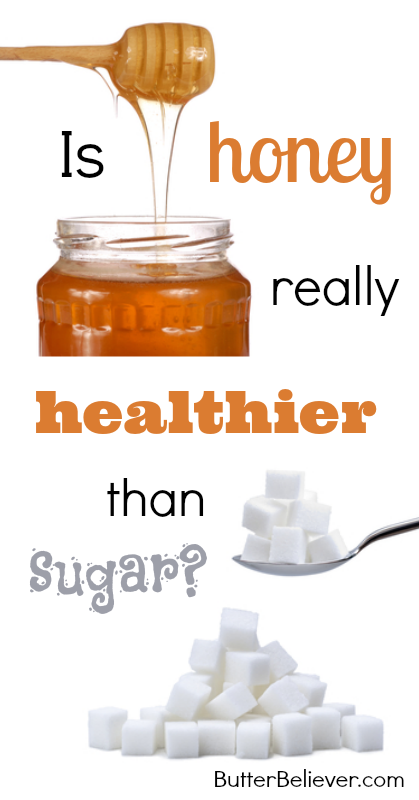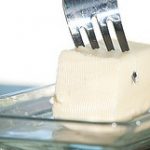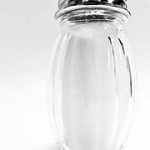Honey is supposed to be healthier than sugar, right? Because it’s… natural, right?
I’ve been seeing a lot of borderline sensationalism when it comes to promoting honey and other natural sweeteners, so I thought I’d try to clarify the differences between the holy honey everyone is worshipping, and sugar—AKA, the Spawn of Satan* (…right?).
(*Psst… Actually, this is not a “Sugar is sugar and all sugar is toxic so don’t touch any source of sugar or you’ll die an early death!!” sugar-bashing post, believe it or not. Sorry. But stay with me, please.)
While I am a fan of honey and I think it contains unique nutrients just like many other whole foods, I think there are some misconceptions about it being drastically different than teh ebil sugar as far as how the sugars it contains affect your body.
For the purposes of this post, I’m going to refer to granulated cane sugar as “sugar,” even though a lot of the time, white, granulated sugar is actually made from GMO sugar beets. I stay away from generic “sugar” for that reason—I avoid GMOs and also chemically-processed foods. But sucrose is sucrose. Both traditional cane sugar (made from evaporated sugar cane juice), whether it’s highly processed or not, and beet sugar are both mostly sucrose. (And for the record, I buy and use organic, lightly-processed and fair-trade cane sugar, myself.)
The real differences between honey and sugar
Both honey and sugar are comprised of roughly equal amounts of glucose and fructose. The main difference is that with honey, the two molecules are separate and not bound together—honey is comprised of primarily monosaccharides (mono meaning one, saccharide meaning sugar, basically). Sugar is comprised of primarily a disaccharide (di meaning two types of sugars, joined together), which is sucrose. Sucrose has the same glucose and fructose that you find in honey, but the two are chemically bound together.
But what happens when you digest these types of carbohydrates? Both monosaccharides and disaccharides eventually become the same thing—that’s because disaccharides and polysaccharides (even more complex sugar chains) digest and break down into individual sugars, or monosaccharides. When you eat honey, you get glucose and fructose. When you eat sugar, you get sucrose. But give it a little bit, and you’re gonna get glucose and fructose separately from sugar, just like with honey.
Both also raise blood sugar in a similar manner. That’s not necessarily a bad thing—your body needs glucose in your bloodstream to support the metabolism. Sugar and honey, both being simple sugars, have similar glycemic index ratings that actually aren’t considered to be in the “high” GI category.
The sugars in honey and cane sugar are digested and metabolized in different areas of the body, though. The sucrose in sugar requires an enzyme located in the small intestine, to digest it and break down the bonded sugars into separate and more readily-available fructose and glucose. From there, the glucose can be released into the bloodstream to be used directly by your cells for energy, while the fructose must first be converted into glucose—some of that conversion happens in the small intestine, and some in the liver. In honey’s case, the fructose and glucose are already separated, and don’t require enzyme digestion, but the fructose still has to wait until it reaches the small intestine to be converted to glucose, or released to the liver for conversion. The free glucose that came from the honey initially, however, is able to be used faster to meed the body’s energy needs.
So, say you’re hiking up a mountain and need a quick energy boost—a honey stick, or an energy bar made with honey, would give you that boost a little faster than sugar would, from the immediately-available glucose. Sugar would eventually give you the glucose too—it just takes a bit longer.
What I’m getting at, is that your body ultimately doesn’t see any difference between the sugars from honey, and from cane sugar. So, say what you want about how terrible sugar is for you, but you have to acknowledge that the sugar in honey is essentially the same thing as far as your body is concerned. It all ends up being the same nutrients in the end—glucose that serves as your primary cellular fuel source to supply your body with energy. (Hooray, metabolism!)
Why choose honey?
So, are there any legit reasons to elevate honey’s status over sugar? Sure! Honey, especially quality raw honey, does offer benefits that regular sugar doesn’t.
For me, though, the primary reason why I would choose to eat or cook with honey instead of sugar is the taste—honey just works better for some purposes and certain recipes in which the flavor and texture is a better match.
But, there are several good reasons to include honey in your diet (other than its tastiness). Here are some of the more compelling health benefits of honey as well as the nutritional value it has.
- Oligosaccharides: Though the sugars in honey are primarily monosaccharides glucose and fructose, there are also some more complex sugar chains known as oligosaccharides present. These sugars may be responsible for some of honey’s benefits, as they have been shown to have prebiotic activity which may have an effect on gut health and even insulin resistance.
- Enzymes and probiotics: Bees themselves have been found to possess an impressive array of beneficial bacteria within their little bee guts, and these probiotic bacteria can also be found in honey and may help proliferate lactic acid bacteria found in your own gut, along with various enzymes that may aid in digestion.
- Antioxidants: Honey contains polyphenols, which are a class of antioxidants that are thought to reduce the risk of heart disease, cancer, and other illness. Regular consumption of honey can increase levels of beneficial polyphenols in the blood.
- Trace amounts of vitamins & minerals: There’s about a half dozen or so vitamins that are found in honey (like vitamin C, niacin, and folate), but none are more than about 1% of the RDA. A few minerals show up in the nutritional analysis, but honey only provides between 0 and 4% of the RDA for each. There’s also some beneficial amino acids found in honey.
- Antibacterial and antiviral properties: Honey contains natural antibacterial enzymes, including one that actually produces hydrogen peroxide. That’s why honey may be able to boost the immune system when dealing with a bacterial or viral infection.
- Natural pollen traces that help to treat seasonal allergies: Because local, raw honey will contain traces of pollen that are local to you (i.e., they’re the same pollens that are triggering your allergy symptoms), eating the honey can help to “immunize” or desensitize you to those pollens. This can help alleviate allergy symptoms over time. I’ve heard lots of anecdotal evidence that this works quite well!
- Lots of benefits when used topically. Honey is ultra-moisturizing as a natural humectant for your skin and hair, and those antibacterial properties even make it a great natural wound dressing.
There are also some unique benefits to cane sugar, too (especially unrefined evaporated sugarcane juice), although that’s a story for another post. But, all in all, honey does have some impressive qualities that are worth considering.
How to choose quality honey
All those aforementioned benefits pretty much only apply to high-quality, minimally processed and ideally raw honey. Many types and brands of commercially-produced honey are so highly processed and treated that the resulting honey offers no real benefit whatsoever over plain sugar.
So if you want a wholesome honey, what should you look for? Well, supporting local farmers is always a good decision, and especially if you’re interested in alleviating allergy symptoms related to local pollens, buying honey from as close to your own backyard as you can is best.
If you want to get the most out of your honey, you’ll want to spring for honey that’s truly raw, so that none of those beneficial enzymes, probiotics, or other nutrients are damaged from heat processing. Although, for recipes that require cooking, I wouldn’t waste raw honey on those. Regular organic honey is a fine choice if it’s going to be heated anyway.
Here’s a few options you can order online that I’d recommend:
[easyazon_image add_to_cart=”yes” align=”none” asin=”B000Z93FQC” cloaking=”default” height=”160″ localization=”default” locale=”US” nofollow=”default” new_window=”default” src=”http://ecx.images-amazon.com/images/I/41WmvU8XgSL._SL160_.jpg” tag=”buttebelie-20″ width=”91″]organic, lightly-processed and fair-trade cane sugar[/easyazon_image] [easyazon_image add_to_cart=”yes” align=”none” asin=”B00014JNI0″ cloaking=”default” height=”160″ localization=”default” locale=”US” nofollow=”default” new_window=”default” src=”http://ecx.images-amazon.com/images/I/31Moh0VlZYL._SL160_.jpg” tag=”buttebelie-20″ width=”110″]organic, lightly-processed and fair-trade cane sugar[/easyazon_image][easyazon_image add_to_cart=”yes” align=”none” asin=”B001LQWO8I” cloaking=”default” height=”160″ localization=”default” locale=”US” nofollow=”default” new_window=”default” src=”http://ecx.images-amazon.com/images/I/417SPe%2BvkIL._SL160_.jpg” tag=”buttebelie-20″ width=”129″]organic, lightly-processed and fair-trade cane sugar[/easyazon_image][easyazon_image add_to_cart=”yes” align=”none” asin=”B0090REQAY” cloaking=”default” height=”160″ localization=”default” locale=”US” nofollow=”default” new_window=”default” src=”http://ecx.images-amazon.com/images/I/51Q2i0%2BNSRL._SL160_.jpg” tag=”buttebelie-20″ width=”160″]organic, lightly-processed and fair-trade cane sugar[/easyazon_image]
Do you believe in the benefits of honey?
Share your thoughts in the comments below.






Raw honey is the healthiest way to consume honey, it contains it’s vitamins, minerals and enzymes. I found a lot of great info on raw honey at http://www.benefitsrawhoney.com
Why is it that honey is the only sweetener allowed on the GAPS diet? If they are so similar, would it be okay to consume sugar on the GAPS diet?
There is an assumption with this article that the digestive system is working fine. The reason that GAPS and SCD diets specify honey is because the individuals they are targeting have compromised digestive and/or immune systems. When the small intestine is damaged and enzymes are lacking, it cannot break down the di- and polysccharides into the monosaccharides. This is when you get yeast overgrowth, etc. The damaged small intestine can handle the monosaccharides and transfer energy for the cells. Many autistic children and those with autoimmune diseases have this damage to the digestive system. Yeast overgrowth leads to leaky gut, which fuels autoimmune responses as large particles of food enter the blood stream.
No, you can’t substitute sugar. When you have gut damage, your intestine’s ability to manufacture enzymes is disturbed, and it can’t break the sucrose down into fructose and glucose. The sucrose instead sits and feeds bacteria, causing bloat, discomfort, and yet more intestinal damage.
As an urban beekeeper, I am all for real, local honey. Will be sharing this post. Thank you!
Great, informative post! What you talk about at the end is not only the reason I try to eat raw honey, but eat real food for all the time – processed foods don’t usually have that stuff like probiotics, antioxidants, immune system boost, etc. Some people think they’re ok with eating junk food and popping a multivitamin! These benefits that aren’t just the generic Vitamin A or Vitamin C are often overlooked.
Thanks for the post!
What about pure maple syrup? How does that compare?
Also, many commercial beekeepers producing honey for the mass market now feed their bees high fructose corn syrup instead of letting them out to pollinate. yet another reason to know your farmer!
When my daughter started kindergarten she came down with cold after cold. With her, colds usually settle in her chest and she ends up with some sort of respatory infection. After doing some research I came across Raw Organic Honey. She has a teaspoon in the am and at night. I was amazed at how well it protects her from getting colds. I have no scientific evidence that it is the honey that has helped my girl stay so healthy, but from my own observations, it has done wonders!
@Danielle,
Thx for that info, as a Muslim we study the benefits of honey from our holy book ( the Quran) on which there is an entire chapter on the importance of Bees. Clearly the Raw Honey is the magic ingredient it’s talking about. God bless
Oh puleez!
I use honey bought at a village and according to the seller, it’s collected from wild beehives in the forests. I take the honey with tea/ginger, and I do love to use it when roasting beef or chicken. May I know your thoughts on stevia? Is it really better than taking sugar?
Ah. That’s a great question and something I’ve been meaning to address for a while! I do not personally recommend stevia. It has the potential to basically “trick” your body into thinking it’s getting energy from glucose, then when no energy comes, you wind up with blood sugar imbalances and excessive cravings. It’s definitely better to eat (preferably high quality cane) sugar, in my opinion.
I love honey when roasting meats, too. 🙂
For a second there I thought you were going to end up saying “forget honey, just eat regular sugar,” until I read the whole article.
I also tend to use honey as my sweetener of choice simply because…it tastes so darn good!!! There is a bee-keeping farm that produces raw honey close by where I live, and I’ve started to get my honey from there. It’s awesome! If I don’t use honey, I use maple syrup that my dad makes from the big maple tree in his front yard in the early spring.
I’ve discovered that by using both of those sweeteners, I don’t really have a use for the refined white stuff you get in stores – they not only taste great, but they SMELL heavenly too! Plus, I like knowing exactly where it came from and how it was processed.
By the way, I’m loving this blog. I’ve been eating “real” foods, that is foods that aren’t overly-processed, imitations (butter included) for a few months now and I’m loving it. The health benefits have been more than I could have hoped for. I started blogging about it as well. While my blog is not nearly as detailed or established as yours, (it’s still in the growing stages), I invite you to have a look if you get a chance. Check it out at http://theartofcare.weebly.com
Thanks for this post!